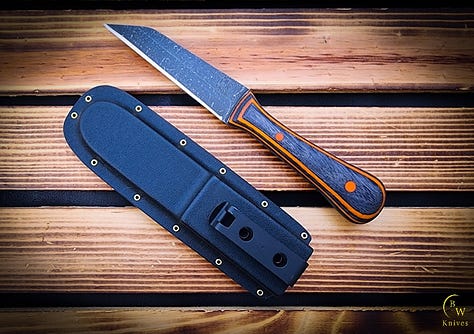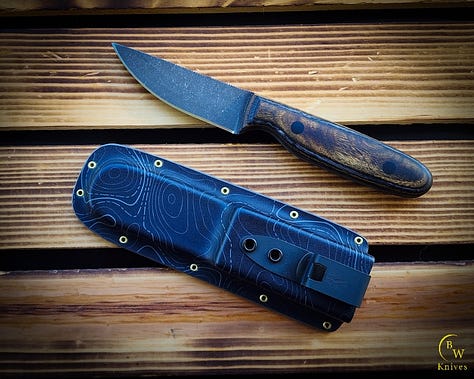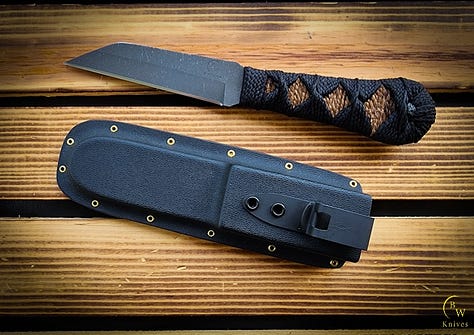Custom Knife Making with Brad Walker
Hanging out with the man behind BW Knives, a Knoxville business producing top-quality pocket knives for aficionados and people like me, too.
Two Christmases ago, my father-in-law gifted me a handmade knife: a beautiful, stainless steel fixed blade with a smooth wooden handle and Kydex sheath perfect for clipping into my pocket to show off to my male friends.
I don’t have much practical use for a pocket knife. Most of my days are spent either sitting in front of a computer screen or with a book open on my lap. But after observing in my first year down south how every male (and most females) in East Tennessee seemed to pack a blade, I thought it’d look cool to own one. I slowly put together a collection, and whenever the weather is right for long pants, I clip one into my pocket or slide it onto my belt in hopes of tricking strangers into believing I’m more badass than I really am.
From fall through spring, the knife from Brad Walker’s Verna series is a regular feature on my right hip. In fact, I’ve gotten so used to taking the thing out to show it off that last May I got myself into a bit of trouble when I carried it to a friend’s house in Kodak and forgot it on a shelf. When I called the next day to ask about it, the eldest of his three boys—not yet 10—answered and informed me that his parents were unavailable because they’d been tied to the kitchen chairs, then shared a long list of demands that included a truckload of assorted snacks (Pop Tarts, Skittles, the like), a yellow lab puppy, and a BB gun. Fortunately, officers from the Sevier County Sheriff’s Department arrived in time to rescue my friends, who are now under witness protection. And even better for me, the cops gave back my knife, which is in my pocket as I write this.
Brad, who makes and sells his handiwork under the moniker BW Knives, could not have imagined a buffoon like me misusing his products when he launched his business in 2020. Noble craftsmen toiling away in hot sheds and garages, making things most people prefer to buy for $15 at Walmart, are too busy for that. Yet even in the midst of preparing orders, he was kind enough to invite me over to his workshop to get a first-hand look at his process and learn about what makes somebody with a day job as a mortgage broker spend his nights placing meticulously-fashioned blades into a kiln heated to 1900 degrees Fahrenheit (significantly above the temperature range capable of melting away skin and bones).
The workshop is housed in a white shed beside Brad’s place, a short drive down the road from my own in Halls Crossroads. His grandfather built the shed in the 1960s out of scraps from a torn-down barn beside the creek. On one side, Brad makes the blades and assembles the knives; on the other, he makes the handles and keeps the chemicals necessary for finishing. Appropriately for a guy who names his knives after various real or fictional villains from horror films and folklore, he was blaring death metal upon my arrival.1
Considering the fine quality of the product, I assumed Brad had been making knives for decades. But he didn’t get his start in the craft until 2016. Before that, his main pastime outside of work was a karate school he ran out of Beaver Dam Baptist Church.2 One day, he and his sons turned on the History Channel show Forged in Fire, and a new passion was born. The boys, 13 and 11 at the time, didn’t see why they couldn’t do the same thing in the backyard. Before long, Brad was building his first forge out of cinder blocks, fire brick, and an old hair dryer. The first knives looked like prison shanks.3
Using railroad spikes, scrap steel, and more sophisticated (and expensive) machinery purchased over their years of gaining experience in the craft, the Walker boys churned out coat hooks, keychains, fireplace pokers, and anything else they could think up or find on YouTube. Brad made his first official knife sale in 2019 to a fellow Keller-Williams agent. Months later, in the midst of COVID, requests began pouring in from people who saw his handiwork on Instagram.
Making a top-quality knife is neither easy nor cheap. Though he once used carbon steel like the kind you’d find in a lower-priced store knife, Brad now uses high-quality Nitro-V stainless steel from a company in New Jersey4. In a video on social media, the tip of one of his Nitro-V blades penetrates a quarter without breaking. He even bet his sons he could slice through chain mail (the medieval battle armor kind), which he proceeded to do without breaking a sweat.
To keep up with his production schedule, Brad orders 15 four-foot bars of steel at a time (a total cost of about $600). Once it’s in his workshop, he takes a bar and with a template draws the various knife shapes onto it. The kiln can fit eight blades, so he does eight at a time. Drawing, cutting, shaping, and drilling holes takes a day. Afterward, the blades are heat-treated. The process takes nine hours and involves the kiln, a cryo bath, and his kitchen oven, where the blades are tempered. For a stonewashed finish, Brad soaks the blades in ferric chloride, covers them in WD-40, and slides them into a tube filled with rocks (the decorative garden variety). Handles he designs and shapes from either wood or jute twine. The Kydex sheaths that come standard with each order are made by another Knoxville artisan doing business under the name Offensive Industries.



All in all, it takes Brad about a week to prepare a knife. And while the price—between $225 and $275, depending on size or intricacy—seems high if you’re used to junk (as I am), he’s only broken even on costs in the past year. As with most folks who make precious things for strangers to cherish, if he were doing it for the money, he would’ve quit a long time ago.
We spent about two hours in his shop, with Brad explaining his process slowly and carefully. Since I was recording the conversation on my phone, I tended to look around the shop distractedly as he spoke. All around me were blades that hadn’t made the final cut. Rather than toss them in the trash, Brad stabbed them into the walls and beams, where they serve as painful reminders of the time-consuming nature of getting better at a thing you love. It was then that I realized that I didn’t need to comprehend the science behind knife-making to appreciate it, just as I don’t need to recreate a guitar solo to enjoy good rock-n-roll or paint a portrait to see the beauty in an art museum.
Now that I’ve spent an afternoon hanging out with the man behind my pocket knife, I can take greater pleasure when I use it to whittle marshmallow spears while camping with the kids or break down boxes late on a Tuesday night. When so much of what I own was either ordered off Amazon or bought in a store, it’s easy to imagine my Verna as only the finished product and overlook the many steps in the chain, most of which involved another person’s ingenuity and time, that had to happen before it showed up at my door.
I’m thankful folks like Brad are still making things for people like me. And, even more so, that there are people like my father-in-law who recognize the value of their work, pay for it, and then give the goods away to those of us who are still weaning ourselves from paying for junk made overseas by someone who will never invite us into their shed to see how the magic happens.
Check out BW Knives on Instagram and at an upcoming Gun and Knife Show at the Knoxville Expo Center.
Read previous The Weekly Big Head columns.
Upgrade your subscription for as little as $4.17/month to join The Attic Club, where I share a super-secret dispatch every week, plus early drafts of other projects.
Some of Brad’s knives' names include Erebus, the personification of darkness from Greek mythology and the name of a house of vampires in the Blade films; Tepes, the Romanian word for Impaler; and Verna, after Leatherface’s mom in the Texas Chainsaw Massacre franchise.
Here’s some useful trivia I learned from Brad. The Isshinryu branch of karate was introduced in the United States by an East Tennessean named Harold Long, who had learned it from the founder (Tatsuo Shimabuku) while stationed in Japan during his service in the Marine Corps.
Brad’s youngest son, Kaleb, operates his own knife-making business under the moniker Crossroad Custom.
If you know anything about knives or steel, this is AEB-L steel enriched with nitrogen and vanadium.




